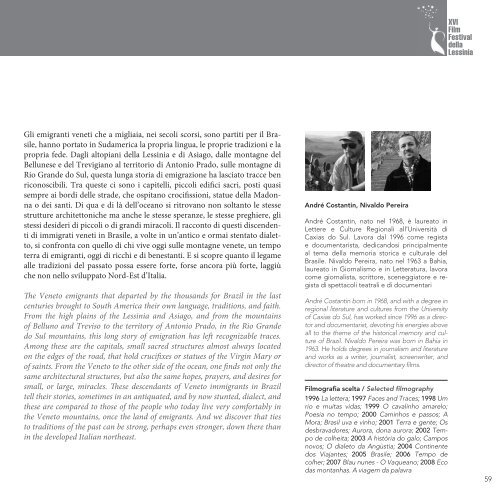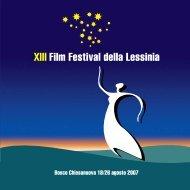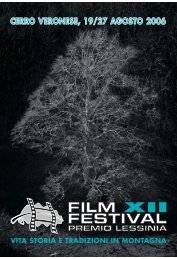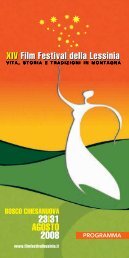2010 Interno Catalogo FFL.indd - Film Festival della Lessinia
2010 Interno Catalogo FFL.indd - Film Festival della Lessinia
2010 Interno Catalogo FFL.indd - Film Festival della Lessinia
Create successful ePaper yourself
Turn your PDF publications into a flip-book with our unique Google optimized e-Paper software.
Gli emigranti veneti che a migliaia, nei secoli scorsi, sono partiti per il Brasile,<br />
hanno portato in Sudamerica la propria lingua, le proprie tradizioni e la<br />
propria fede. Dagli altopiani <strong>della</strong> <strong>Lessinia</strong> e di Asiago, dalle montagne del<br />
Bellunese e del Trevigiano al territorio di Antonio Prado, sulle montagne di<br />
Rio Grande do Sul, questa lunga storia di emigrazione ha lasciato tracce ben<br />
riconoscibili. Tra queste ci sono i capitelli, piccoli edifi ci sacri, posti quasi<br />
sempre ai bordi delle strade, che ospitano crocifi ssioni, statue <strong>della</strong> Madonna<br />
o dei santi. Di qua e di là dell’oceano si ritrovano non soltanto le stesse<br />
strutture architettoniche ma anche le stesse speranze, le stesse preghiere, gli<br />
stessi desideri di piccoli o di grandi miracoli. Il racconto di questi discendenti<br />
di immigrati veneti in Brasile, a volte in un’antico e ormai stentato dialetto,<br />
si confronta con quello di chi vive oggi sulle montagne venete, un tempo<br />
terra di emigranti, oggi di ricchi e di benestanti. E si scopre quanto il legame<br />
alle tradizioni del passato possa essere forte, forse ancora più forte, laggiù<br />
che non nello sviluppato Nord-Est d’Italia.<br />
Th e Veneto emigrants that departed by the thousands for Brazil in the last<br />
centuries brought to South America their own language, traditions, and faith.<br />
From the high plains of the <strong>Lessinia</strong> and Asiago, and from the mountains<br />
of Belluno and Treviso to the territory of Antonio Prado, in the Rio Grande<br />
do Sul mountains, this long story of emigration has left recognizable traces.<br />
Among these are the capitals, small sacred structures almost always located<br />
on the edges of the road, that hold crucifi xes or statues of the Virgin Mary or<br />
of saints. From the Veneto to the other side of the ocean, one fi nds not only the<br />
same architectural structures, but also the same hopes, prayers, and desires for<br />
small, or large, miracles. Th ese descendants of Veneto immigrants in Brazil<br />
tell their stories, sometimes in an antiquated, and by now stunted, dialect, and<br />
these are compared to those of the people who today live very comfortably in<br />
the Veneto mountains, once the land of emigrants. And we discover that ties<br />
to traditions of the past can be strong, perhaps even stronger, down there than<br />
in the developed Italian northeast.<br />
André Costantin, Nivaldo Pereira<br />
André Costantin, nato nel 1968, è laureato in<br />
Lettere e Culture Regionali all’Università di<br />
Caxias do Sul. Lavora dal 1996 come regista<br />
e documentarista, dedicandosi principalmente<br />
al tema <strong>della</strong> memoria storica e culturale del<br />
Brasile. Nivaldo Pereira, nato nel 1963 a Bahia,<br />
laureato in Giornalismo e in Letteratura, lavora<br />
come giornalista, scrittore, sceneggiatore e regista<br />
di spettacoli teatrali e di documentari<br />
André Costantin born in 1968, and with a degree in<br />
regional literature and cultures from the University<br />
of Caxias do Sul, has worked since 1996 as a director<br />
and documentarist, devoting his energies above<br />
all to the theme of the historical memory and culture<br />
of Brazil. Nivaldo Pereira was born in Bahia in<br />
1963. He holds degrees in journalism and literature<br />
and works as a writer, journalist, screenwriter, and<br />
director of theatre and documentary fi lms.<br />
<strong>Film</strong>ografi a scelta / Selected fi lmography<br />
1996 La lettera; 1997 Faces and Traces; 1998 Um<br />
rio e muitas vidas; 1999 O cavalinho amarelo;<br />
Poesia no tempo; 2000 Caminhos e passos; A<br />
Mora; Brasil uva e vinho; 2001 Terra e gente; Os<br />
desbravadores; Aurora, dona aurora; 2002 Tempo<br />
de colheita; 2003 A história do galo; Campos<br />
novos; O dialeto da Angùstia; 2004 Continente<br />
dos Viajantes; 2005 Brasile; 2006 Tempo de<br />
colher; 2007 Blau nunes - O Vaqueano; 2008 Eco<br />
das montanhas. A viagem da palavra<br />
XVI<br />
<strong>Film</strong><br />
<strong>Festival</strong><br />
<strong>della</strong><br />
<strong>Lessinia</strong><br />
59





